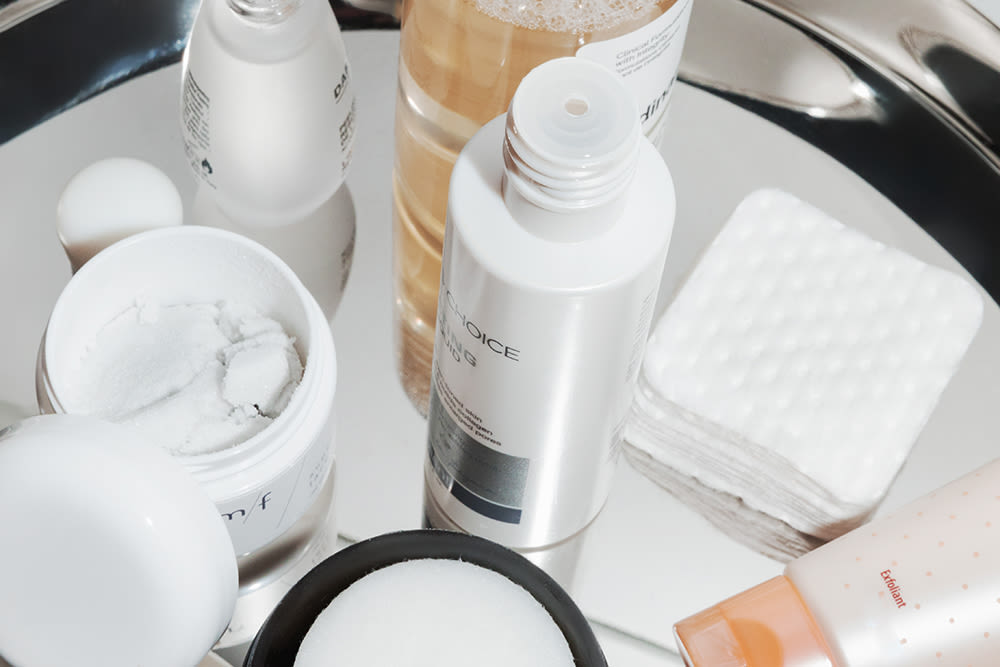If I lived in the opening credits of Grease, the morning after I tried Skinbetter’s Alpharet Overnight Cream for the first time would probably be storyboarded like this: I’d roll out of bed, skulk to the bathroom, push my hair out of my face to look in the mirror and—eee er eee er eee er, my cartoon hands would make windshield wipers over my eyes as I tried to take in my reflection. I’m glowing! Grease is the word!
OK, sure, that’s some animated hyperbole. But I really did notice a difference in my skin’s texture after my first use. The thing is, Alpharet is sort of a dermatologist secret. You have to buy it through an authorized doctor, and Skinbetter’s “where to buy” website directory is like a who’s who of top Manhattan derms. I only found out about the brand when Sofie Pavitt let word slip in her Top Shelf, raving about this retinoid-AHA hybrid. By three weeks of every-other-night usage my complexion was more even, less red, and a lot smoother than when I started, and now that I’ve been using it for nearly two months I have nary a bad word to speak about it.
Because they work at different levels of the skin, AHAs and retinoids can work synergistically towards a smoother complexion. But… the emphasis is on the can. “We already know about the efficacy of these ingredients,” says Dr. Diane Berson, a Manhattan-based dermatologist who specializes in acne and wrinkle prevention. "But just like everything in dermatology, you always have to balance efficacy and tolerability." Many people (like me) do find retinoids to be irritating, and adding another active ingredient can also exacerbate redness, dryness, and flakiness.
“In the old days, dermatologists loved giving patients a retinoid to use at night and an AHA for the morning. They were rarely compliant,” Dr. Berson notes, because the combination left folks with irritation. But she adds, “The original retin-A,” a prescription-grade retinoid you can only get from a dermatologist, “was very irritating.” Dr. Berson cites a couple innovations that helped improve the irritation situation: first, synthetic slow-release retin-A hit the market. “Instead of hitting your face all at once, the retinoid would be absorbed gradually, and with less irritation.” And second, synthetic retinoids like Differin and Tazorac were developed with anti-inflammatory properties. On top of making retinoids more tolerable, minimizing inflammation also helps keep acne and fine-line-chiseling oxidative stress at bay.
Thanks to its extremely unique delivery system, Dr. Berson thinks Alpharet is the next evolution of retinoids. The two star ingredients are a retinoid and the gentle AHA lactic acid, a combination that’s also in cult facialist Shani Darden’s Top 25-winning Retinol Reform. The difference is, instead of mixing them up in a bottle together, Skinbetter scientists actually modified the lactic acid and the retinoid to create one super molecule: ethyl lactyl retinoate. “This molecule is very stable, and it’s also extremely well tolerated,” explains Dr. Berson. And it’s also stronger than your average retinol—the why is super science-y, but essentially the molecule uses a form of retinoid that’s more closely related to the prescription stuff. Why doesn’t it lead to loads of irritation? Like the next-gen retinoids mentioned above, ethyl lactyl retinoate works over time—the lactic acid and retinoid are only released as the bonds between them are gradually broken, so they’re absorbed at a pace your skin can handle.
By the way, the rest of the formula isn’t chopped liver, either. It’s bolstered by anti-inflammatory bisabolol, allantoin, and niacinamide, to soothe the skin before irritation starts. The moisturizing squalane, ceramides, and cholesterol can’t hurt either. Plus, you’ve got a wrinkle-plumping peptide combo (the same two that are in brand-name blend Matrixyl 3000), a sprinkling of moisture-binding humectants, and a handful of powerful antioxidants like coenzyme q10. “As we all know, antioxidants are important along with sunscreen to prevent oxidative damage and free radical production,” says Dr. Berson. In other words, a retinoid cream can be gentle without compromising its efficacy with the right teammates on its side, and Skinbetter’s stacked the team.
Dr. Berson recommends Alpharet (rather than a prescription for retin-A) when a patient has sensitive, dry, or delicate skin. I also think it’s particularly good for those looking to streamline—I recommended it yesterday to a friend who wanted the benefits of retinoids and exfoliating acids, but knew she wouldn’t stick to an extra two steps in her routine. A new Top Shelf staple, perhaps? Internet, get to work.
—Ali Oshinsky
Photo via ITG

